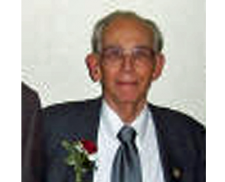Sun-Gazette Reflects on Career of Magistrate Judge Askey
From the April 12, 2008 Williamsport Sun-Gazette:
Long-time federal judge dies less than four months after retirement
By R.A. WALKER
Retired U.S. Magistrate Judge William H. Askey died early Friday at age 88 in the Gatehouse hospice at Divine Providence Hospital.
His death came less than four months after he retired for health reasons and ended a federal career of 43 years and 10 months.
Askey initially was appointed in 1964 to be the local part-time U.S. commissioner, a position later renamed U.S. magistrate and then magistrate judge with the same basic responsibilities.
“I love the work,” Askey explained when asked about his staying power.
In a retirement interview with this newspaper in December, Askey admitted he was at times amazed by the trouble people create for themselves and the things they are capable of doing to themselves and others.
He said he “always tried to treat each person with respect” when they were brought before him.
“I’ve always known, and operated knowing, that a person is innocent until proven guilty,” he said.
Askey was not a man who sought the limelight, but he had a brief brush with history when he signed the order that released Watergate figure G. Gordon Liddy from federal prison.
Liddy, a White House aide and former FBI agent linked to the Watergate burglary that brought down President Richard M. Nixon, already had served four years in prison when he appeared before Askey in 1977 to arrange payment of his federal fines so he could be released.
At the time, federal prisoners still owing fines could be held until they were paid. Liddy owed about $40,000.
The hearing grew national attention and was moved to a federal courtroom to accommodate the crowd.
Askey signed an order allowing Liddy’s release, but remembers Liddy as just another prisoner.
“He didn’t have anything to say,” Askey recalled. “He just was a person like any other person.”
Askey said he easily handled more than 100 criminal cases a year.
Thousands appeared before him, most of them for their initial federal court appearance — a proceeding during which the charges are explained and bail set or denied.
“I thought I was accomplishing something important every time a case came to me,” he said.
As Askey faced retirement he said he would have stayed on if his health were better.
“It’s been a real privilege and an honor to serve,” he added.
Like 93-year-old U.S. District Senior Judge Malcolm Muir, Askey kept on working while many of his peers settled into retirement age.
“I think he’s rendered excellent service,” Muir said of Askey’s career.
Muir, who continues to hear cases, had a long-time friendship with Askey during the last four decades and for years they had lunch together four times a week at the Ross Club.
As time passed, Muir recalled Friday, many of their lunch companions passed on and in time he and Askey became the last survivors of what had been two tables of eight.
Muir remembered Askey as “thoroughly honest and thoroughly fair and very much a gentleman.”
Askey was a graduate of Williamsport High School and Bucknell University. He entered the U.S. Army Air Corps as a private in 1941 and left active duty as a captain five years later. While on inactive status he was promoted to major.
He graduated from the University of Pittsburgh School of Law and began practicing law here in 1951.
Askey closed his private practice four years ago, moving into an office on the second floor of the courthouse and holding hearings in available courtrooms. Prior to that, Askey conducted most court proceedings at his law office.
When asked for a highlight of his career, Askey chose a long night years ago that he spent at his law office signing papers for a criminal case that was about to break.
“I was in the office until daylight,” he said.
As Askey recalled it, the first thing he noticed as he was leaving that morning was the sound of birds chirping.
He was exhausted as he headed home, he said, but felt good because he had been able to help get something important done.

